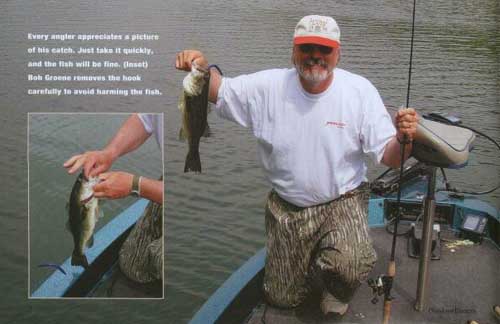 |
Home | Search | Browse | About IPO | Staff | Links |
 |
Home | Search | Browse | About IPO | Staff | Links |
|
Catch 'em, Put 'em A little extra precaution can maximize the benefits of catch-and-release fishing.
STORY BY P. J. PEREA Without a doubt, catch-and-release fishing is one of the beneficial developments in bass angling. Despite the constant fishing pressure on many of our popular lakes, largemouth and smallmouth bass populations are healthy in many lakes and rivers throughout the state. Much of the program's success is due to good fisheries management, the cooperation of anglers following the length and creel regulations and the catch and release of fish by recreational bass anglers. All these practices ensure that enough adult fish are available to repopulate the lake annually. With the increase in popularity of tournament bass fishing, there has been some concern about the effects of tournament stress on fish and what happens to fish after they are released. Steven Cooke, a Ph.D. student at the University of Illinois and researcher with the Illinois Natural History Survey (INHS), is studying the physiological and behavioral effects of angling stress on largemouth and smallmouth bass. Cooke, an avid angler in his free time, is interested in improving angling practices for the benefit of the species and ultimately the benefit of anglers, as well. Cooke outfitted his finned subjects with sophisticated telemetry devices that allowed him to continuously monitor physiological indicators of stress on the cardiac systems of the fish. Cooke defined the degree of stress based on the length of recovery time needed to return to base levels of cardiac activity. The longer it took the fish to return to normal, the more stressful the event. The fish were then put through the rigors of a fishing tournament— angling, capture, livewell time, weigh-

2 OutdoorIllinois
in and release under a variety of controlled conditions. After several years of research, Cooke developed some suggestions that would reduce the risk of harming the fish. Say Cheese! "Of all the things that fish go through, air exposure is the most detrimental," Cooke said. "The longer the fish is out of the water, the longer it will take to recover." Time devoted to the "grip and grin" photo opportunities shortly after the fish are caught and at tournament weigh-ins can be harmful, according to Cooke. Anglers need to be very conscientious about exposing the fish to long periods out of the water. When anglers need to find a camera, or locate someone to photograph a fish, the fish should be placed in a livewell and not left flopping on the deck of the boat. Cooke suggested the use of alternative methods of weighing fish, such as water displacement or on-the-water weighing.
Nesting Bass "Fishermen that target nesting fish should angle fish quickly and return them to the water immediately, nearby their nest," Cooke stated. Nesting bass have limited energy reserves during the spawning season. Fishing for them reduces their ability to defend the nest and, during the recovery time, their offspring are vulnerable to predation from nest-robbing fish. Prior research by Dr. Dave Philipp at the INHS has suggested that the probability a male fish will abandon its nest increases if the fish is held out of the water for an extended time, or if the fish is released far from its nest. Cooke strengthens this argument with his physiological research. The Big Chill Cooke also pointed out several practices used by anglers that might not be as beneficial to the fish as they think. They include adding ice to the livewells to reduce the fish's metabolic rate and adding water conditioners to reduce fish stress and mortality. Cooke's research also showed that cooled fish actually needed more time to recover than fish held in regular lake or river water. The cooling caused a stressful shock to the systems of the fish when they were returned to regular water. Fish conditioners that employ chemicals to help fish recover also increased recovery time. Cooke theorized that the chemicals caused the fish to lose water and actually increased the stress since the fish must restore the lost water to regain chemical balance. The Future Cooke emphasized that catch-and-release is still a very important practice and is far better than catch-and-keep when it comes to maintaining fish populations. As a result of his work, other biologists at the INHS are working on other aspects of catch-and-release fishing.
July 2002 3 |
|
State Library |